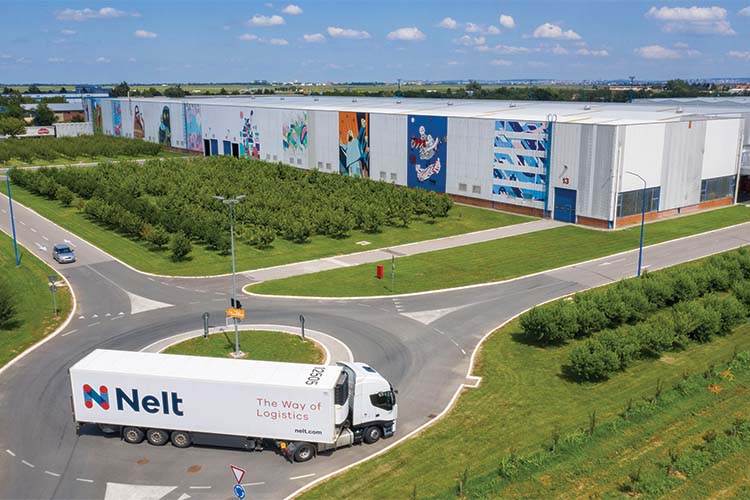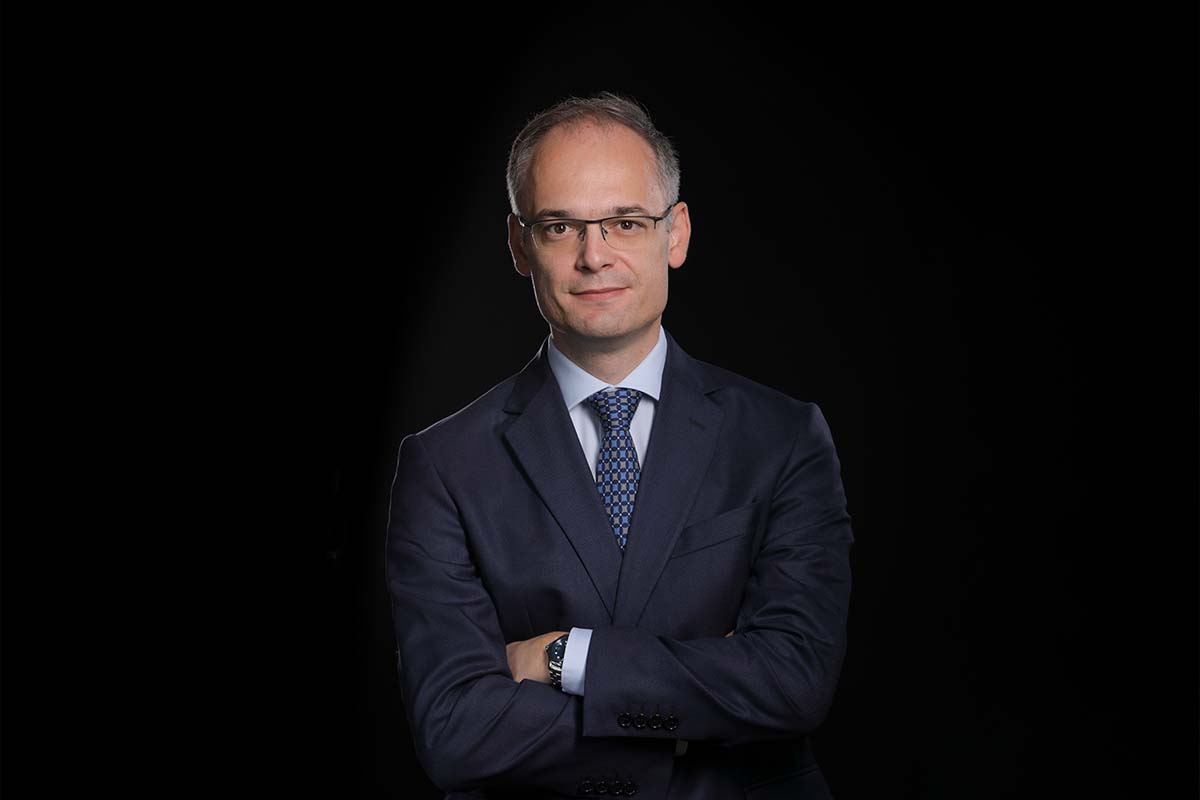As a large company that has a portfolio containing more than 300 brands and that serves 26,000 customers, Nelt possesses a huge amount of data. At the start of 2022, Nelt Group completed and announced its new strategy, “Accelerate2025”, which assumes accelerated revenue growth
Nelt’s strategic initiatives, all of which are in the domain of digital transformation, are key sources of competitive advantage for the Group. They make Nelt more “future proof” by building capabilities that are hard for others to copy and that will keep them “ahead of the pack” for years to come.
For Nelt Group, 2022 proved to be a very successful year marked by increased revenue, new investments and the expansion of operations. Despite unfavourable circumstances, you managed to achieve growth of 14 per cent.
At the start of 2022, we completed and communicated our new strategy, “Accelerate2025”. As the title suggests, this strategy assumes accelerated revenue growth. The first year of implementing our new strategy has been successful, as the revenue growth of 14% is the highest growth rate at Nelt over the last six years.

As part of our strategy, we exerted quite a bit of effort to define not only our strategic goals and the segments and markets where we want to compete, but also the enabling factors necessary to implement this strategy successfully. We have worked and invested throughout the year to build these enablers, first and foremost investing in our organisation by developing internal talents and acquiring external ones.
How do you preserve and fortify your position as the region’s leading distributor?
Indeed, our strategic initiatives, all of which are in the domain of digital transformation, are key sources of our competitive advantage. They make Nelt more “future proof” by building capabilities that are hard to copy and that will keep us “ahead of the pack” for years to come.
All of these initiatives have several common goals:
• Improve the customer and employee experience;
• Simplify, automate and accelerate processes;
• Accelerate revenue growth;
• Optimise costs;
• Reduce the environmental footprint of operations.
Is it an accurate stat that as many as 60% of the projects that you’ve implemented since 2018 have included new solutions in the domain of digital transformation?
That is correct… and going forward I expect this percentage to be even bigger. At Nelt we have a “healthy dissatisfaction” with the status quo. One recent example has been the design and implementation of new software to optimise our sales and delivery routes. This has resulted in us optimising our routes by approximately 700,000 km at an annual level, while in the process reducing fuel consumption by 100,000 litres and reducing our CO2 emissions by 265 tons.
What are all the areas encompassed and which segments of operations are included in the scope of your ACCELERATE2025 umbrella strategy?
Our strategy has three layers. The first layer consists of our strategic goals, as well as the focus markets and segments where we want to compete. The second layer of our strategy encompasses our five strategic initiatives: data management and analytics; omni-channel sales platform; trade funds management; route optimisation and; paperless delivery. Comprising the third layer of our strategy are the enablers, which will help us be winners in our targeted segments and markets, and to implement our strategic initiatives. Those enablers are grouped into four categories: organisation; processes and capabilities; infrastructure and technology and; sources of competitive advantage.
If used intelligently, technology can help eliminate inefficiencies, thereby securing much needed “fuel” to fund new growth, which in turn can create more jobs
Our omni-channel sales platform is one of our strategic initiatives. It caters to our customers’ expectations that they will be able to communicate with, order products from, and exchange documents and data with Nelt at any time via different channels – whether our salespeople, our call centre, or via the Nelt Market B2B application. During 2022 we successfully launched the first element of this new platform, our Nelt Market B2B app, on the markets of Zambia and Mozambique. The first results have been very encouraging and we look forward to expanding the launch to include other countries in 2023.
This year also saw us expand the implementation of our paperless delivery initiative. This project simplifies the delivery process, eliminates the need for corrective documents in the case of errors, and digitalises the exchange of documents. After a year of implementation, around 40% (~9,100) of our customers in Serbia have adopted this way of working with Nelt, helping us issue 47% (around 900,000) of our invoices in an electronic format.
You’ve invested two million euros in data management architecture and tools that you jointly develop with companies Microsoft and SAS?
Data is the core around which all of our strategic initiatives revolve. Nelt, as a large company with more than 300 brands in its portfolio and 26,000 customers that it serves, possesses a huge amount of data. The goal of the data management project is to better utilise this data to create new value for all stakeholders in our value chain.

The first goal of this project is to ensure quick and easy access to all of our data. This is why we have created new cloud-based system architecture, where we are storing all relevant data. The second goal of the project is to “clean” and standardise all the data that we possess – both internal and external. This was no easy task, due to the sheer quantity and diversity of the data we have. We are now about to launch our automated reporting, while we are also in the process of developing advanced algorithms both in our supply chain and sales operations.
Is there any truth to the claim that automation and digitalisation will lead to the eliminating of more jobs than last year?
Automation and technology are not about eliminating jobs and reducing the number of people. If used intelligently, technology can help eliminate inefficiencies, thereby securing much needed “fuel” to fund new growth, which in turn can create more jobs. We are using technology in parallel to eliminate inefficiencies, but that also helps us invest in new growth and create new jobs. One example is the investment of 20 million euros in our newly opened Candy Factory in Angola, which alone has created close to a hundred new jobs at Nelt.
Expanding your operations to new markets is one of your strategic priorities. How achievable is that?
As mentioned earlier, volatile times are times when larger and more capable companies have an opportunity to further strengthen their market position. This year has proven that, as we have secured new distribution partnerships with reputable companies like Chipita (Mondelez) in Serbia and Bosnia-Herzegovina, Mondelez in Mozambique, Colgate in Zambia, Chips Way in Serbia, Montenegro, Albania and Kosovo, and Dijamant and Jamnica in North Macedonia. We also have new logistics partnerships with Podravka, Molson Coors, Aleva, Inditex and Frezenius Medical Care.
How much importance do you attach to environmentally and socially sustainable operations?
Environmentally and socially sustainable operations represent one of the strategic imperatives of Nelt Group. This past year, we issued the 3rd edition of our Sustainability Report that highlights our impact on the economy, the environment and the community using the globallyrenowned GRI methodology. The top enabler to becoming more sustainable is not technology – it is developing a mindset that sees sustainability as being everyone’s job, and that is part of all our activities and operations.
We also invested in solar energy this year, thus further reducing our environmental footprint.
